
Lesbian, gay, bisexual, transgender, and queer (LGBTQ) people in the U.S. state of Wyoming may face some legal challenges not experienced by non-LGBTQ residents. Same-sex sexual activity has been legal in Wyoming since 1977, and same-sex marriage was legalized in the state in October 2014. Wyoming statutes do not address discrimination on the basis of sexual orientation and gender identity; however, the U.S. Supreme Court's ruling in Bostock v. Clayton County established that employment discrimination against LGBTQ people is illegal under federal law. In addition, the cities of Jackson, Casper, and Laramie have enacted ordinances outlawing discrimination in housing and public accommodations that cover sexual orientation and gender identity.
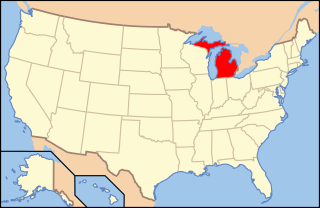
Lesbian, gay, bisexual, and transgender (LGBTQ) people in the U.S. state of Michigan enjoy the same rights as non-LGBTQ people. Michigan in June 2024 was ranked "the most welcoming U.S. state for LGBT individuals". Same-sex sexual activity is legal in Michigan under the U.S. Supreme Court case Lawrence v. Texas, although the state legislature has not repealed its sodomy law. Same-sex marriage was legalised in accordance with 2015's Obergefell v. Hodges decision. Discrimination on the basis of both sexual orientation and gender identity is unlawful since July 2022, was re-affirmed by the Michigan Supreme Court - under and by a 1976 statewide law, that explicitly bans discrimination "on the basis of sex". The Michigan Civil Rights Commission have also ensured that members of the LGBT community are not discriminated against and are protected in the eyes of the law since 2018 and also legally upheld by the Michigan Supreme Court in 2022. In March 2023, a bill passed the Michigan Legislature by a majority vote - to formally codify both "sexual orientation and gender identity" anti-discrimination protections embedded within Michigan legislation. Michigan Governor Gretchen Whitmer signed the bill on March 16, 2023. In 2024, Michigan repealed “the last ban on commercial surrogacy within the US” - for individuals and couples and reformed the parentage laws, that acknowledges same sex couples and their families with children.
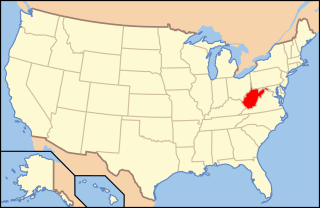
Lesbian, gay, bisexual, transgender, and queer (LGBTQ) people in the U.S. state of West Virginia face legal challenges not faced by non-LGBT persons. Same-sex sexual activity has been legal since 1976, and same-sex marriage has been recognized since October 2014. West Virginia statutes do not address discrimination on account of sexual orientation or gender identity; however, the U.S. Supreme Court's ruling in Bostock v. Clayton County established that employment discrimination against LGBTQ people is illegal.

Lesbian, gay, bisexual, transgender, and queer (LGBTQ) people in the U.S. state of Georgia enjoy most of the same rights as non-LGBTQ people. LGBTQ rights in the state have been a recent occurrence, with most improvements occurring from the 2010s onward. Same-sex sexual activity has been legal since 1998, although the state legislature has not repealed its sodomy law. Same-sex marriage has been legal in the state since 2015, in accordance with Obergefell v. Hodges. In addition, the state's largest city Atlanta, has a vibrant LGBTQ community and holds the biggest Pride parade in the Southeast. The state's hate crime laws, effective since June 26, 2020, explicitly include sexual orientation.

Lesbian, gay, bisexual, transgender, and queer (LGBTQ) people in the U.S. state of Pennsylvania enjoy most of the same rights as non-LGBTQ people. Same-sex sexual activity is legal in Pennsylvania. Same-sex couples and families headed by same-sex couples are eligible for all of the protections available to opposite-sex married couples. Pennsylvania was the final Mid-Atlantic state without same-sex marriage, indeed lacking any form of same-sex recognition law until its statutory ban was overturned on May 20, 2014.
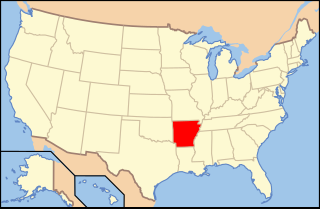
Lesbian, gay, bisexual, transgender, and queer (LGBTQ) people in the U.S. state of Arkansas face legal challenges not experienced by non-LGBTQ residents. Same-sex sexual activity is legal in Arkansas. Same-sex marriage became briefly legal through a court ruling on May 9, 2014, subject to court stays and appeals. In June 2015, the U.S. Supreme Court ruled in Obergefell v. Hodges that laws banning same-sex marriage are unconstitutional, legalizing same-sex marriage in the United States nationwide including in Arkansas. Nonetheless, discrimination on the basis of sexual orientation and gender identity was not banned in Arkansas until the Supreme Court banned it nationwide in Bostock v. Clayton County in 2020.
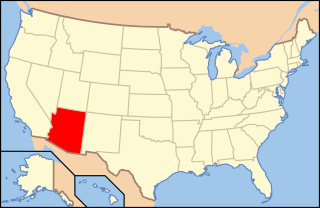
Lesbian, gay, bisexual, transgender, and queer (LGBTQ) people in the U.S. state of Arizona may face legal challenges not experienced by non-LGBTQ residents. Same-sex sexual activity is legal in Arizona, and same-sex couples are able to marry and adopt. Nevertheless, the state provides only limited protections against discrimination on the basis of sexual orientation and gender identity. Several cities, including Phoenix and Tucson, have enacted ordinances to protect LGBTQ people from unfair discrimination in employment, housing and public accommodations.

Lesbian, gay, bisexual, transgender, and queer (LGBTQ) rights in the U.S. state of Indiana have been shaped by both state and federal law. These evolved from harsh penalties established early in the state's history to the decriminalization of same-sex activity in 1977 and the legalization of same-sex marriage in 2014. Indiana was subject to an April 2017 federal court ruling that discrimination based on sexual orientation is tantamount to discrimination on account of "sex", as defined by the Civil Rights Act of 1964. The ruling establishes sexual orientation as a protected characteristic in the workplace, forbidding unfair discrimination, although Indiana state statutes do not include sexual orientation or gender identity among its categories of discrimination.
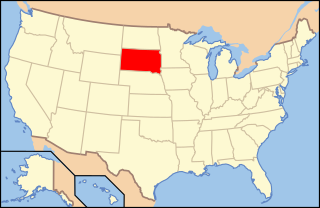
Lesbian, gay, bisexual, transgender, and queer (LGBTQ) people in the U.S. state of South Dakota may face some legal challenges not experienced by non-LGBTQ residents. Same-sex sexual activity is legal in South Dakota, and same-sex marriages have been recognized since June 2015 as a result of Obergefell v. Hodges. State statutes do not address discrimination on account of sexual orientation or gender identity; however, the U.S. Supreme Court's ruling in Bostock v. Clayton County established that employment discrimination against LGBTQ people is illegal under federal law.

Lesbian, gay, bisexual, transgender, and queer (LGBTQ) people in the U.S. state of South Carolina may face some legal challenges not experienced by non-LGBTQ residents. Same-sex sexual activity is legal in South Carolina as a result of the U.S. Supreme Court decision in Lawrence v. Texas, although the state legislature has not repealed its sodomy laws. Same-sex couples and families headed by same-sex couples are eligible for all of the protections available to opposite-sex married couples. However, discrimination on the basis of sexual orientation and gender identity is not banned statewide.

Lesbian, gay, bisexual, transgender, and queer (LGBTQ) people in the U.S. state of Nebraska may face some legal challenges not experienced by non-LGBTQ residents. Same-sex sexual activity is legal in Nebraska, and same-sex marriage has been recognized since June 2015 as a result of Obergefell v. Hodges. The state prohibits discrimination on account of sexual orientation and gender identity in employment and housing following the U.S. Supreme Court's ruling in Bostock v. Clayton County and a subsequent decision of the Nebraska Equal Opportunity Commission. In addition, the state's largest city, Omaha, has enacted protections in public accommodations.
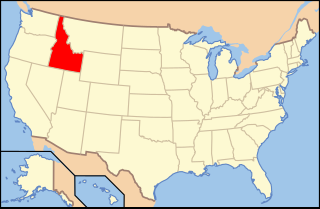
Lesbian, gay, bisexual transgender, and queer (LGBTQ) people in the U.S. state of Idaho face some legal challenges not experienced by non-LGBTQ people. Same-sex sexual activity is legal in Idaho, and same-sex marriage has been legal in the state since October 2014. State statutes do not address discrimination based on sexual orientation and gender identity; however, the U.S. Supreme Court's ruling in Bostock v. Clayton County established that employment discrimination against LGBTQ people is illegal under federal law. A number of cities and counties provide further protections, namely in housing and public accommodations. A 2019 Public Religion Research Institute opinion poll showed that 71% of Idahoans supported anti-discrimination legislation protecting LGBTQ people, and a 2016 survey by the same pollster found majority support for same-sex marriage.

Lesbian, gay, bisexual, transgender, and queer (LGBTQ) people in the U.S. state of Kansas have federal protections, but many face some legal challenges on the state level that are not experienced by non-LGBTQ residents. Same-sex sexual activity is legal in Kansas under the US Supreme Court case Lawrence v. Texas, although the state legislature has not repealed its sodomy laws that only apply to same-sex sexual acts. The state has prohibited discrimination on the basis of sexual orientation and gender identity in employment, housing and public accommodations since 2020. Proposed bills restricting preferred gender identity on legal documents, bans on transgender people in women's sports, bathroom use restrictions, among other bills were vetoed numerous times by Democratic Governor Laura Kelly since 2021. However, many of Kelly's vetoes were overridden by the Republican supermajority in the Kansas legislature and became law.

Lesbian, gay, bisexual, transgender, and queer (LGBTQ) rights in the U.S. state of Alaska have evolved significantly over the years. Since 1980, same-sex sexual conduct has been allowed, and same-sex couples can marry since October 2014. The state offers few legal protections against discrimination on the basis of sexual orientation and gender identity, leaving LGBTQ people vulnerable to discrimination in housing and public accommodations; however, the U.S. Supreme Court's ruling in Bostock v. Clayton County established that employment discrimination against LGBTQ people is illegal under federal law. In addition, four Alaskan cities, Anchorage, Juneau, Sitka and Ketchikan, representing about 46% of the state population, have passed discrimination protections for housing and public accommodations.
The Sexual Orientation Non-Discrimination Act (SONDA) is a New York law which prohibits discrimination on the basis of actual or perceived sexual orientation in employment, housing, public accommodations, education, credit, and the exercise of civil rights. Passed in 2002, SONDA added the term "sexual orientation" to the list of specifically protected characteristics in various state laws, including the Human Rights Law, the Civil Rights Law, and the Education Law.

Leslie Carol Rutledge is an American attorney and politician who has served as the 21st lieutenant governor of Arkansas since 2023. A member of the Republican Party, she was previously the 56th attorney general of Arkansas from 2015 to 2023.
This is a list of notable events in the history of LGBTQ rights that took place in the year 2015.
This is a list of notable events in the history of LGBT rights that took place in the year 2016.















